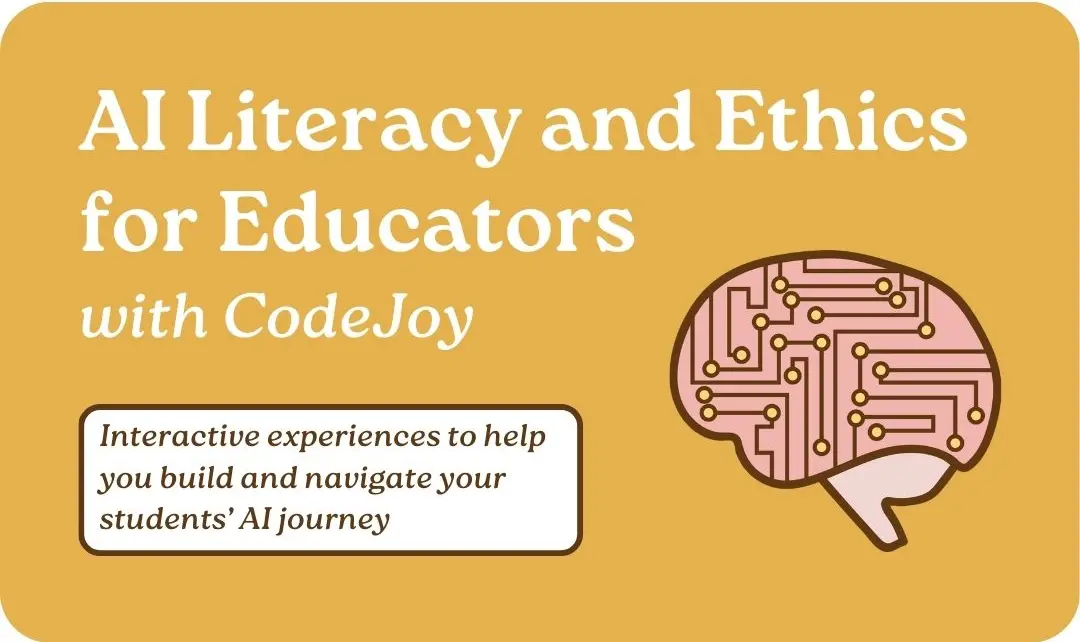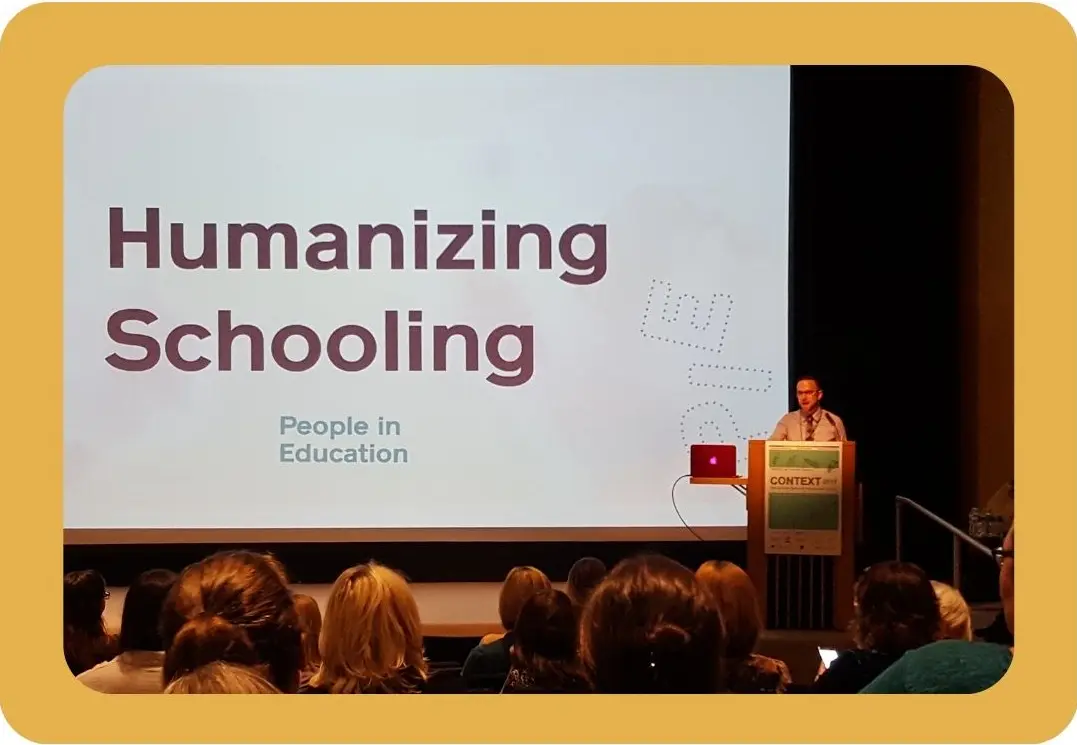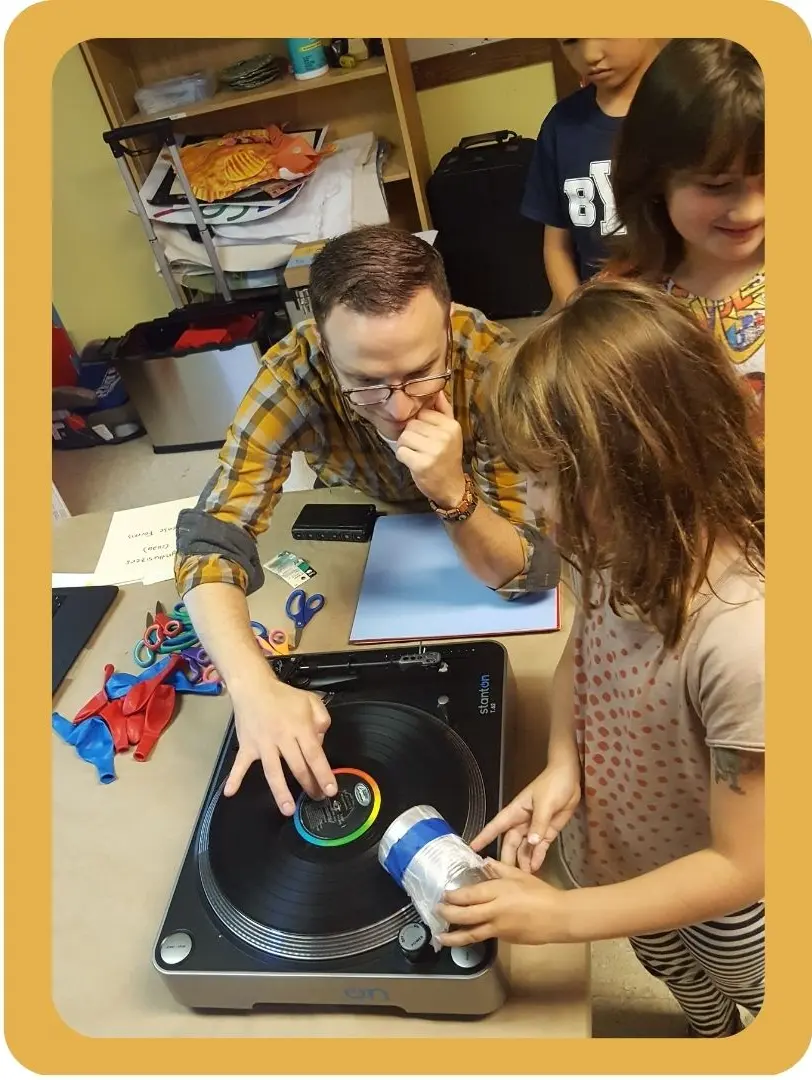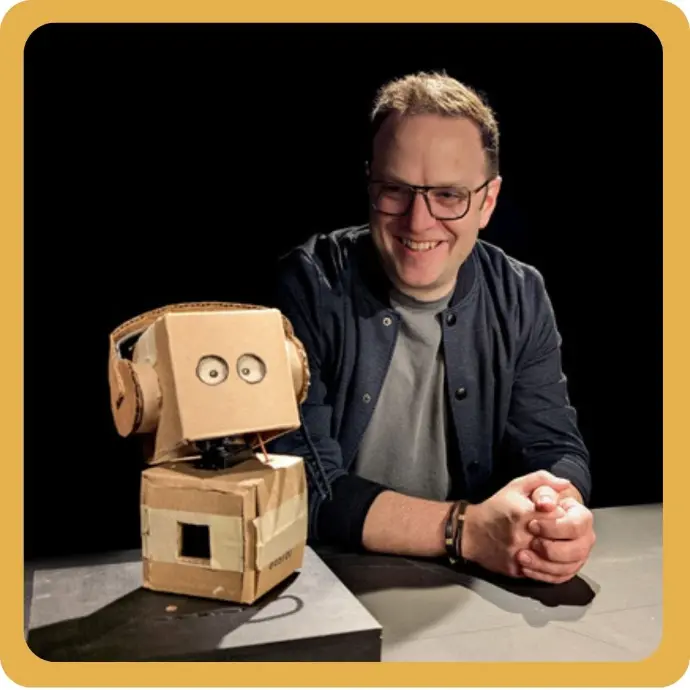CodeJoy snagged a chat with the brilliant Jordan Mroziak, the co-teacher for our upcoming Pathfinders Summer Institute PD course, 'AI Literacy and Ethics for Educators.' Jordan's here to spill the beans on what makes this course a must-attend, why AI won't be replacing teachers anytime soon (phew!), and how you can equip yourself with the tools and knowledge to navigate this ever-evolving tech landscape with confidence. Let's explore the fantastic possibilities that AI brings to education!
Amanda Jeane Strode (AJS): What course are you teaching and what makes you excited about it?
 Jordan Mroziak (JM): The AI Literacy and Ethics for Educators summer course is an opportunity to pick apart some core literacies around AI and deliver them in a way that I think is really tactile for people. AI tends to be very abstract and a bit more ambient in the way that it presents itself. We will provide opportunities for people to experiment in a “rubber hits the road,”kind of way. It's not just theoretical but helping people to actually implement and practice things. We are aiming to have an impact on both the educator, in discussing pedagogy, and also the learner, in what they're seeing and experiencing.
Jordan Mroziak (JM): The AI Literacy and Ethics for Educators summer course is an opportunity to pick apart some core literacies around AI and deliver them in a way that I think is really tactile for people. AI tends to be very abstract and a bit more ambient in the way that it presents itself. We will provide opportunities for people to experiment in a “rubber hits the road,”kind of way. It's not just theoretical but helping people to actually implement and practice things. We are aiming to have an impact on both the educator, in discussing pedagogy, and also the learner, in what they're seeing and experiencing.
AJS: How are you feeling about this collaboration with CodeJoy?
JM: I think that finding partners is one thing but finding like-minded partners that you genuinely enjoy is another thing. I’m excited to help the efforts of CodeJoy grow, because I'm acknowledging that I'm not a computer scientist by trade, I'm not an engineer. So the expertise of CodeJoy as thought partners in that way will bring a new light on the work that I’m excited to explore. I don't think you actually have a great sense of what you know until you have to teach it to someone else, right? And so I think it's very much coming up against my barriers of what feels comfortable. I’m looking forward to moving through these barriers to create something that's genuinely more expansive, thoughtful, and intentional.
AJS: What do you find rewarding about teaching educators?
JM: One is that there's an acknowledgement that there's a systemic impact, right? I think that the composition of the stone thrown into the pond is one thing. The ripples are the other — perhaps a more beautiful thing. Each one of those people [teachers] are going to go out into the field and hopefully personalizing the work in whatever way makes sense for themselves and for their learners and their community. That's always really exciting. I get to bear witness to, and see it actually play out. Then I think the other thing that feels very real is my personal growth of knowing that I'm able to be in community with people who have expertise in the field of education but in a different way. I get to be a part of something that is humbling — acknowledging that the conversations that take place are possible because of the joy and wisdom of the people that are sitting inside of that room, right? There's a unique conversation that is only possible at that moment based upon the expertise that sits there. I'm personally interested in finding that conversation and having it be a place for collective growth and expansion.
right? I think that the composition of the stone thrown into the pond is one thing. The ripples are the other — perhaps a more beautiful thing. Each one of those people [teachers] are going to go out into the field and hopefully personalizing the work in whatever way makes sense for themselves and for their learners and their community. That's always really exciting. I get to bear witness to, and see it actually play out. Then I think the other thing that feels very real is my personal growth of knowing that I'm able to be in community with people who have expertise in the field of education but in a different way. I get to be a part of something that is humbling — acknowledging that the conversations that take place are possible because of the joy and wisdom of the people that are sitting inside of that room, right? There's a unique conversation that is only possible at that moment based upon the expertise that sits there. I'm personally interested in finding that conversation and having it be a place for collective growth and expansion.
AJS: What are your thoughts on the impact of AI on the role of teachers today?
JM: That's a big question. First of all, I think it's important to acknowledge and repeat ad nauseam, until people realize, AI will never replace a teacher. It's functionally not the same thing. The role of the educator is not as a knowledge dispenser. And I think that's where people get confused—perhaps why we find ourselves in a cultural moment where teachers are systemically undervalued and the education system is broadly under attack. Teachers are not simply distributors of pieces of knowledge. Teachers are relationship builders, right? They're cultivators of what we are as humans. So I think anyone who would confuse AI for a teacher is deeply misunderstanding and undervaluing what educators do and misunderstanding the role of what education does in creating society and culture. My first reaction is to rapidly defend the role of educators in that conversation.
 The other piece of it is that, I think AI might be able to facilitate some of the more procedural aspects of teaching. Think about the kind of routine activities that teachers are asked to do. Beyond that, I'm hopeful that it might be leveraged as a thought partner by educators but by design and with intention. And this requires a broadening of people's understanding of AI literacies and fluencies as well as not misunderstanding that technology is somehow a replacement for people. We aren’t going to prompt engineer our way into better pedagogy, greater student agency, and deeper critical thinking skills.
The other piece of it is that, I think AI might be able to facilitate some of the more procedural aspects of teaching. Think about the kind of routine activities that teachers are asked to do. Beyond that, I'm hopeful that it might be leveraged as a thought partner by educators but by design and with intention. And this requires a broadening of people's understanding of AI literacies and fluencies as well as not misunderstanding that technology is somehow a replacement for people. We aren’t going to prompt engineer our way into better pedagogy, greater student agency, and deeper critical thinking skills.
AJS: Can you give us a preview of something that we'll be learning in your course this summer?
JM: I'm really interested in teachers grappling with both how various AI systems function as well as seeing how they are limited. One thing we will do is develop machine learning models using something as simple as Google Teachable Machine. It’s a tool that is very easy to utilize and so there's a low technological threshold to entry. Google Teachable Machine does a really great job of highlighting both the affordances of AI when we think about how it is developed as well as inherent biases and pitfalls. AI is built upon massive amounts of data, and then we can dig into where that data comes from, how is it used, who's labeling it and so on.
I don't mean this to beat up on artificial intelligence. I'm excited because it's why I teach it. What AI can do is just as important as knowing what AI fails at. I think that's where we find ourselves right now in this very early moment of teaching these kinds of classes. I'm happy to show you some of the great benefits of knowing how to prompt engineer and I also want you to gain insight into its inherent limitations, right? That's growing our critical consciousness around technology and the role of AI in society.

AJS: Is there anything else that you haven't said that you want to say about this course?
JM: Reflecting on what I've said, I do want to mention that I grew up a child of the X-Files. There's a healthy technological skepticism and systems skepticism inside of me, right? I have an infinite number of critiques. But, I do think it's worth saying that I am genuinely excited by what AI's potential is for educators. Not out of blind acceptance of the thing. It is genuinely because I think that educators deserve to be taught about what technologies can do and what they can't do. And we need to empower educators to make the best choices for themselves and for their classrooms. I am quite certain that this class amongst many of our other opportunities at CodeJoy, that we'll give educators a fair and unbiased educational experience. An experience that is not a blind endorsement of a product or a technology but rather one that respects them as learners and as interrogators of their own pedagogical practice.
AJS: What is something you’re looking forward to?
JM: I have enormous excitement around this blank template that exists right now around AI Education. There's great work happening and lots of really insightful organizations doing that work, but I believe that we find ourselves at a wayfinding moment. It is a critical juncture for education, and I'm hopeful and excited about the possibility of infusing AI learning with ethics and community oriented practices. That feels like an incredibly valuable opportunity to try to seize on — it is something that I both deeply believe in, and has potential to have a real and lasting impact. The possibility of building out learnings that meaningfully engage people in conversations about how to be better humans with one another, while teaching core practices of what technology is and does, that's pretty exciting to me.

Learn more about Jordan on LinkedIn and join him this summer to learn AI.